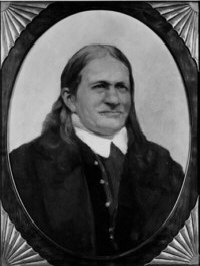<Back to Index>
- Chemist Friedrich Ferdinand Runge, 1795
- Painter Franz Marc, 1880
- 1st Prime Minister of Malaysia Tunku Abdul Rahman, 1903
PAGE SPONSOR

Friedrich (or Friedlieb/Friedlob) Ferdinand Runge (born near Hamburg on 8 February 1795, died in Oranienburg on 25 March 1867) was a German analytical chemist.
Runge conducted chemical experiments from a young age, serendipitously identifying the mydriatic effects of belladonna (deadly nightshade) extract. In 1819, he demonstrated his finding to Goethe, who encouraged him to analyse coffee. A few months later, Runge identified caffeine. Runge studied chemistry in Jena and Berlin, where he obtained his doctorate. After touring Europe for three years, he taught chemistry at the university of Breslau until
1831. From then until 1852 he worked for a chemical company, but was
dismissed by a resentful manager and died fifteen years later in
poverty. His chemical work included purine chemistry, the discovery of caffeine, the blue dye aniline, coal tar products (and a large number of substances that derive from coal tar), paper chromatography, pyrrole, chinoline, phenol, thymole and atropine.